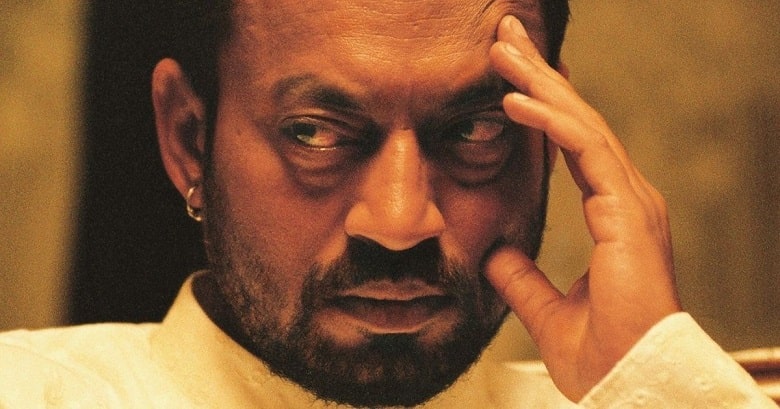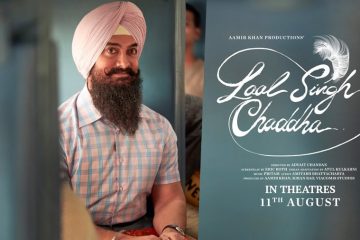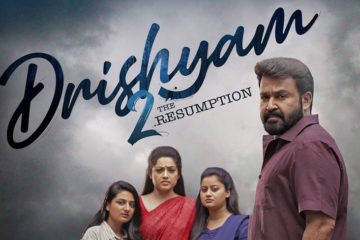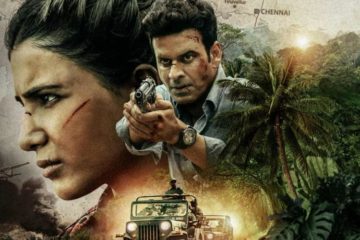Written by : Shreya Seth, Kolkata
Photo credit : Maqbool (2003)
Isn’t it strange how we hail actors as extraordinary beings, as people who instill curiosity, but are far removed from the drudgery of our everyday lives? Our admiration, and sometimes obsession, grows manifold when we witness them playing diverse characters on-screen: the audience, in awe of the actor, who delivered yet another dialogue with the eloquence and grace of an exemplary performer. And of course, that isn’t the end of our experience. The rest is best left to public memory, for it will not let us forget till it exhausts all mediums and platforms. But, do we also celebrate characters in the same way? When we admire a character, we admire them in their entirety with all their flaws and idiosyncrasies. We remember them for the emotions they evoked and the stories they narrated.
I don’t quite remember the first time I watched an ‘Irrfan Khan film’, but I’m convinced it wasn’t in a theatre. I’m certain we wouldn’t have invested our time and money in watching a film steered by an unknown face, especially during a period when mainstream Hindi films were mostly driven by faces, not content. This insouciance of the average cinemagoer in the country may, perhaps, explain how Irrfan Khan made his way to the Indian film industry, unobtrusively. An actor with a humble background, having struggled his way through television series like Shrikant, Chanakya, Chandrakanta, Bharat Ek Khoj (among others) that aired on Doordarshan in fixed slots, to being an internationally acclaimed actor, Irrfan was nothing less than a trailblazer in his own right.
The small yet potent role of a letter-writer in Mira Nair’s Salaam Bombay! (1988) marked his debut in films, which was followed by other stints, until his major breakthrough as a lead in British filmmaker Asif Kapadia’s film, ‘The Warrior’ (2001). But it was with Tigmanshu Dhulia’s crime drama Haasil (2003), where he effortlessly essayed the role of Ranvijay Singh, a conniving and audacious student leader at Allahabad University, that Irrfan earned himself the titular role in Vishal Bhardwaj’s film, Maqbool (2003). An adaptation of Shakespeare’s Macbeth, Maqbool had the finest of performers- Pankaj Kapur, Om Puri, Naseruddin Shah, Piyush Mishra, and Tabu. It would have been a daunting task for any actor to prove their mettle in a film brimming with seasoned artists, but Irrfan was phenomenal as Miyan Maqbool, an unshrinking henchman to Jahangir Khan (Pankaj Kapur), caught between love and ambition on one had, and his guilt-ridden loyalty on the other.
The trajectory that his career took thereon, spoke for itself, just like his eyes. While he collaborated with Mira Nair again, this time as a lead, in ‘The Namesake’ (2006), roles in international films like The Darjeeling Limited (2007), Slumdog Millionaire (2008) and New York, I love you (2008), made him a desirable character actor. Though there was no dearth of international projects like these, Irrfan didn’t give up on the films back home. He kept pushing his boundaries with mainstream films like Deadline (2006), Life in a Metro (2007), Mumbai Meri Jaan (2008), Billu (2009) and 7 Khoon Maaf (2011). Everything seemed to be moving at a steady pace for the actor, until ‘Paan Singh Tomar’ (2012) hit the screens. In his portrayal of the gritty character of Paan Singh Tomar, Irrfan merged the distinct worlds of an athlete turned bandit with an ingenuity that hadn’t been witnessed before. His nuanced understanding of the character didn’t just fetch him the National Film Award, it was a benchmark that redefined the ways of approaching characters like these, with the intense minimalism of Irrfan.
The empathy and spontaneity that he brought to his characters, repeatedly challenged the stereotypical male characters of the Bollywood films. Irrfan’s performance as ‘Saajan Fernandes’ in Ritesh Batra’s ‘The Lunchbox’ (2013), was, to me, the most memorable of his performances. Who else could have manifested the petulant demeanour of a middle-aged man yearning for company, with such finesse, if not for Irrfan? I distinctly remember a scene in the film when he stands in his balcony, holding a cigarette between his fingers, watching a neighbourhood family have their supper, when a little girl abruptly shuts the window, prompting him to look away. Every gesture was measured to perfection, and the palpable silence, resonating more than words could.
What made Irrfan so special was his quest to be ordinary, whether it was as Ashwin Kumar, the sardonic cop in Talvar, (2015) or as the bemused Rana Chaudhary in Piku (2015), his credibility could never be questioned. With the latter, (Piku) he also proved that the antics of the cliched romantic hero were of no match to his eccentricity and refreshing candour! With every film, he dispelled the notion that the mainstream actor had to flex his muscles or bank on a one-liner to ascertain his fate in the industry. He made it look so simple, so believable, that all the actor needed to do was to embrace the character, without any inhibitions. Not all his films yielded results, some went unnoticed, others failed to generate numbers at the box office, but he seemed as unperturbed as he was, even when his film ‘Hindi Medium’ (2017) became one of the highest grossing films of the time. Numbers, to him, were ‘only a by-product’, a consequence- what the actors should concern themselves with, was the storytelling.
Irrfan’s presence in films was soothing. His absence, a loss, to the stories and characters that would be robbed of the deadpan expression, the gentle voice, and sparkling eyes. While he substantially contributed to international cinema with films like ‘Life of Pi’ (2012), ‘The Amazing Spider-man’ (2012), Jurassic World (2015) and Inferno (2016), what he gave to Indian mainstream cinema, was more. He gave us characters for eternity. Characters like ourselves – sometimes reflecting our insecurities as Saajan (The Lunchbox), expressing our anguish as Roohdar (Haider), divulging our desires as Maqbool (Maqbool), or simply reminding us to accept our shortcomings, as Monty (Life in a metro). The only befitting tribute, would be, to remember him for the same.




